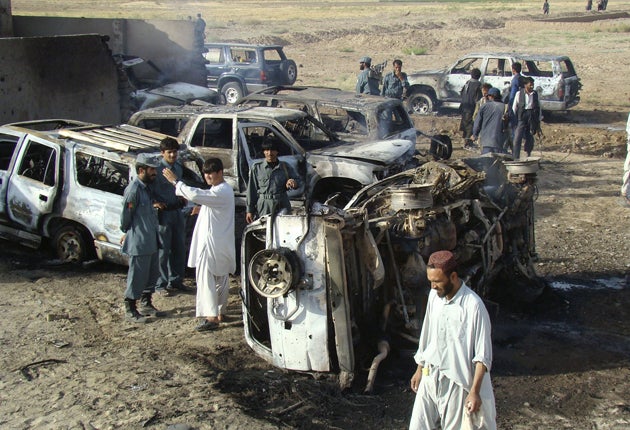Jerome Starkey: The deadly task of fighting against an invisible enemy
Analysis

The grim toll of soldiers coming home from Afghanistan in coffins is testimony to the brutal contest being waged in the poppy fields of Helmand. For three years, British troops have been massively undermanned, underequipped and overstretched as they have tried to convince a deeply cynical population that they are safe from the Taliban.
Most of the province was beyond the reach of British forces. When the troops did come, they rarely stayed. Far from feeling safe, the people watched as the Taliban grew stronger. But the arrival of 8,000 US Marines in Barack Obama's surge is threatening to change the balance – and the Taliban are fighting back.
Helmand is their heartland, its opium is their war chest, and they are desperate to stay in control. When I was in Lashkar Gah, the capital of Helmand, last month many people struggled to understand why Britain and Nato, with all its might, were unable to defeat these ragtag insurgents. I met a shopkeeper selling drinks just 100 metres from the British headquarters. Afghan police had found two improvised explosive devices buried in a culvert in front of his shop.
"When the international troops first came here, they cleaned up all over Afghanistan within a month," said Khan Mohammed. "Now I discover that there's a mine exploding in front of my shop."
Like many people, he had bought into the wild conspiracy theories which flourish in Lashkar Gah's bazaars. "The British must be supporting the Taliban," he said.
But the Taliban know different. More than 3,000 British troops are involved in an operation to clear the roads between Lashkar Gah and Gereshk, Helmand's second largest town. It's an operation that Brigadier Mark Carleton-Smith, who led Taskforce Helmand last summer, hoped to complete, but never did. Without the extra Americans it would have been impossible to succeed because too many of Britain's fighting troops were pinned down in combat outposts dotted along the central section of the river, which runs the length of the valley. The extra US Marines are evidence of hard lessons learnt in Iraq. Senior commanders insist it will "tip the balance". But counter-insurgency experts have already issued a warning that they may not be enough to rout the Taliban completely.
John Nagl, who was recently appointed to the Pentagon's defence policy board, said: "We do not have enough troops to hold what we have cleared in Helmand. The additional American troops are a help, but they are insufficient."
The Taliban have also learnt lessons. Homemade bombs have become their weapon of choice. Where they used to try to overrun British platoon houses, or out-gun them in a firefight, today they watch and wait.
They look at how the soldiers patrol and they watch how they fight. The irrigation ditches that line most of the roads have become a favourite place for improvised explosive devices (IEDs) because the Taliban know that soldiers instinctively dive there for cover when the fighting starts.
Places like Garmsir, where the Marines are deployed, and Babaji, where the British are involved in Operation Panther's Claw, have become so-called "strongholds". The Taliban have been all but free to manufacture IEDs, process poppies into heroin, and terrorise local people.
Students living in the districts have fled to Lashkar Gah. I met three who said the Taliban had closed their schools, the fighting had destroyed their homes, and all three had lost innocent relatives in crossfire.
For the British soldiers on the ground, it's an impossibly frustrating and dangerous mission. They are fighting an enemy they rarely see and trying to win over a population who have suffered terribly since the foreign troops arrived.
The British and the Americans are following an old Nato doctrine of clear, hold and build, but the extra troops means this is the first time they have been able to fulfil it. Both forces have promised to stay in the areas they clear until the Afghan security forces are ready to take over. If it works, it should at least mean that British troops won't have to die clearing these areas a second time.
Join our commenting forum
Join thought-provoking conversations, follow other Independent readers and see their replies
Comments
Bookmark popover
Removed from bookmarks